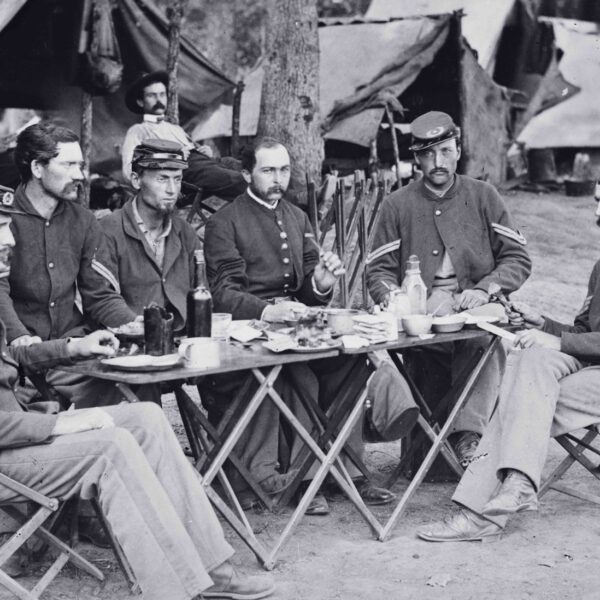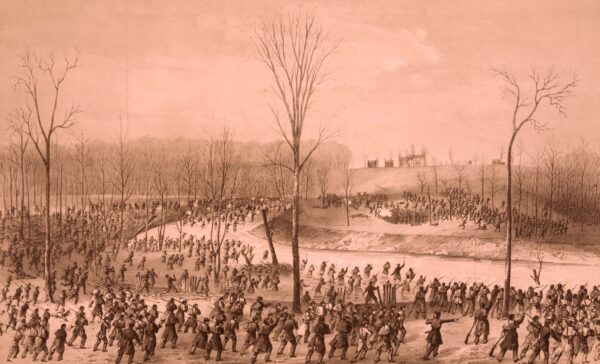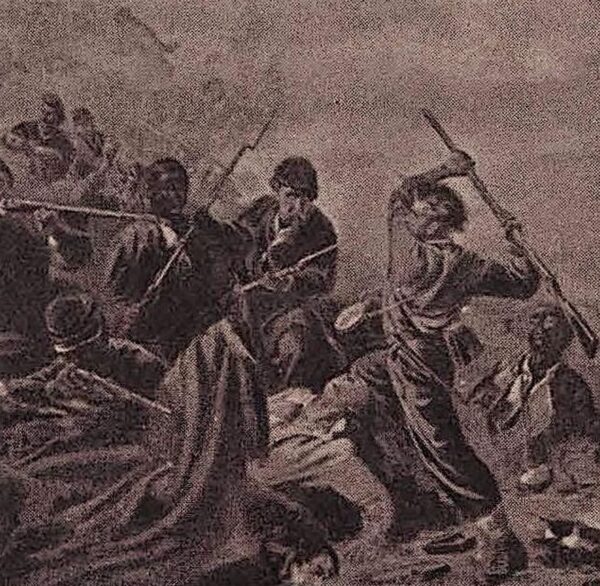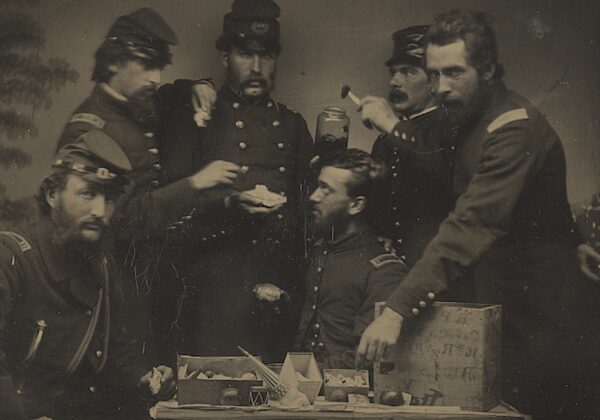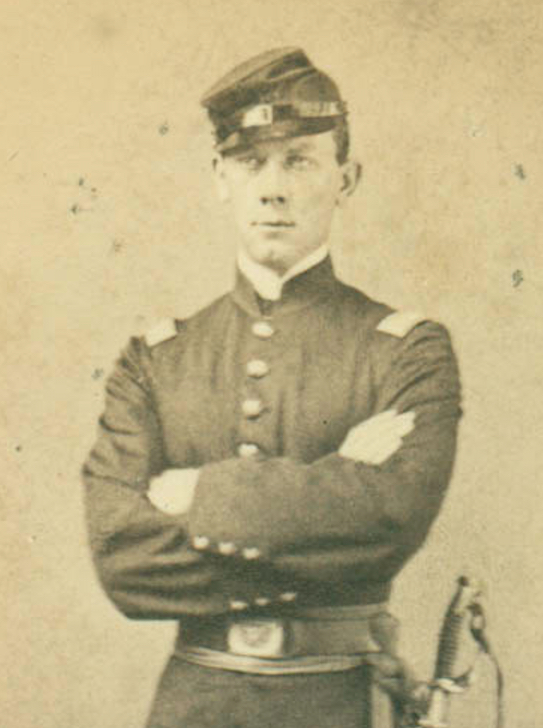
Captain Caspar Crowinshield, 20th Massachusetts Infantry
On October 21, 1861, Union forces crossed the Potomac River to attack what they thought was a Confederate camp near Leesburg, Virginia. Even after they discovered there was no camp—Union scouts had mistaken a line of trees for an enemy camp in the darkness of the previous night—Colonel Edward Baker decided to reinforce the raiding party. A lack of boats delayed the movement; by the time the men were finally in position, Confederates had arrived on the scene, eventually driving the Union troops back over the steep bluff on the riverbank with heavy losses—including Colonel Baker, who was killed.
The next day, Captain Caspar Crowinshield of the 20th Massachusetts Infantry wrote a lengthy letter* to his mother detailing his involvement in the lopsided engagement, known as the Battle of Ball’s Bluff.
Camp Benton, Oct. 22d 1861.
My dear Mother.
I sit down in haste to give you an account of the battle which we have just fought and lost. I had been stationed near the river to support a battery (Ricketts) for about a week. On Sunday at 3 P.M. received orders to march with Capt Bartlett’s Company up the canal about 3 miles from Edwards Ferry, and await orders. When we arrived there we met Col’ Lee and Major Revere who told us that we were to cross the river with 300 men of the 15th Mass Regt. and surprise a rebel camp which was near the town of Leesburg. So at about 11 o’clock we crossed the river to an island some five miles long: there we waited until 3 o’clk in the morning, and then crossed the river into Virginia. As we had only 3 boats to cross in, it took us a long time. One boat would hold about 16 men, another 8, and a third only 4. The width of the river here is about ¼ of a mile or perhaps not so much. The banks on the other side are very precipitous and rocky; however we managed to get up on to high land by marching in single file and picking our way very carefully. It was bright moonlight, and the scene was in-discribably romantic. When we reached the top of the hill, we found ourselves on a broad field of 10 or 12 acres. Here Capt. Bartlett’s and my Company
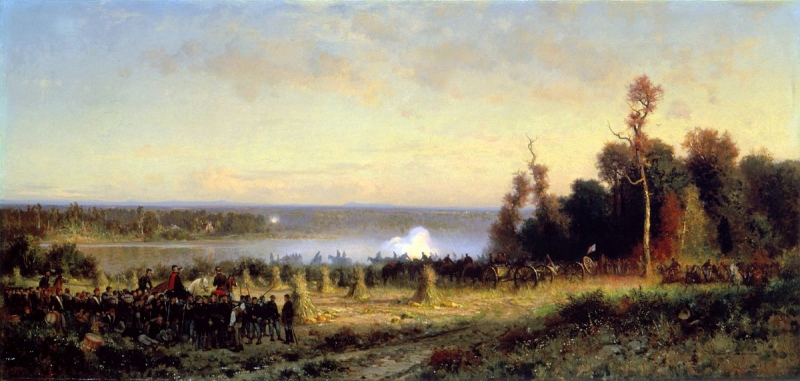
Artist Alfred W. Thompson’s depiction of the fighting at Ball’s Bluff
under Command of the Col. (the Adjutant was also with us) remained as a reserve, and to Cover the 15th in case they should have to retreat. As the 15th advanced, I was sent out on our flank with some men to see if we could discover anything. When we had got about ¼ of a mile, 5 rebels suddenly started up and fired at us wounding one of my men in the arm. We fired and one of them fell, but got up again and ran. We chased them some way, and then returned to where the Col. was stationed. We stationed skirmishers on our flank and awaited the result with much anxiety. We none of us said anything, but I think that all felt, as I did, that we were in a desperate situation, unless the 300 men of the 15th should be completely successful: and then perhaps if we were very quick about it, we might be able to get back across the river. Soon we heard rapid firing in the direction of the 15th. Soon after 2 men Came out of the woods bearing a wounded man in their arms, and told us that the 15th had been attacked by infantry and cavalry, and that they had driven them off, but with the loss of many men, and were retreating to the woods near us. Our Col. now sent a note to Genl. Stone in which he said “if you wish to make a general advance into Virginia, send over a great many more men, if not, we ought to retreat at once”. We had before this had orders “not to retreat until orders from Genl. Stone”. The whole force we had on the Virginia side at this time was 300 of the 15th and 100 of the 20th.
A short time after the Col. sent this message we heard the 15th firing and more wounded men were brought down the road. In about a quarter of an hour the 15th Came up to where we were. The enemy did not follow. If they had, we should have been cut off to a man. Now some reinforcements Came over, but very slowly, as there were only the 3 boats I spoke about, and a flat scow which had been found. At 1 o’clk the fight Commenced on our right flank, and in a short time the rebels were driven back. Then Came a breathing space of 10 minutes. Then they attacked our left flank. Where I was they made a dreadful noise and fired heavily and rapidly. They drove my pickets in and killed at the 1st fire 2 or 3 men. My men stood firm and fought bravely. I was obliged to bring up my reserve, and we drove the rebels back. An interval of quiet, and they advanced cheering, & attacking our whole line. We met them with a severe fire, and they fell back, but they Continued to fire very rapidly, and killed many of our men. They cheered furiously, as their reinforcements came up, and their fire became fiercer & fiercer. Our gunners were almost all shot, and those who remained could not fire very often. My men fell back, and commenced to run. I believe our centre was broken at the same time. I did all I could to stop them and succeeded in stopping about 20 men, with whom I again advanced, and checked the rebels. As they were advancing in great numbers, we could not stop them long however. Here a poor fellow in my Company fell shot through the body. He was standing close to me, and, as he fell he said. “My God. I am shot through”. We had to fall back rapidly now, as our Centre was broken, and had fallen back to the woods on the bank of the river.
I was within 6 feet of Col Baker when he fell. He got up once, and then fell again, and 2 men Carried him off. He had 3 or 4 bullets in him they say. He behaved with the utmost Courage and coolness all through the fight. Our guns had now ceased to fire, and 2 of them had, I think been taken and 1 had been brought back to the edge of the woods. All was now confusion, and the horses, attached to the caisson of the gun, ran, and one was shot just as it was going into the woods, so that the other 3 could not draw the Caisson. This made a breastwork for a time behind which I stood. The fire of the rebels was at this time something terrible. The hill was Swept with bullets and the men were in the woods scattered in all directions.
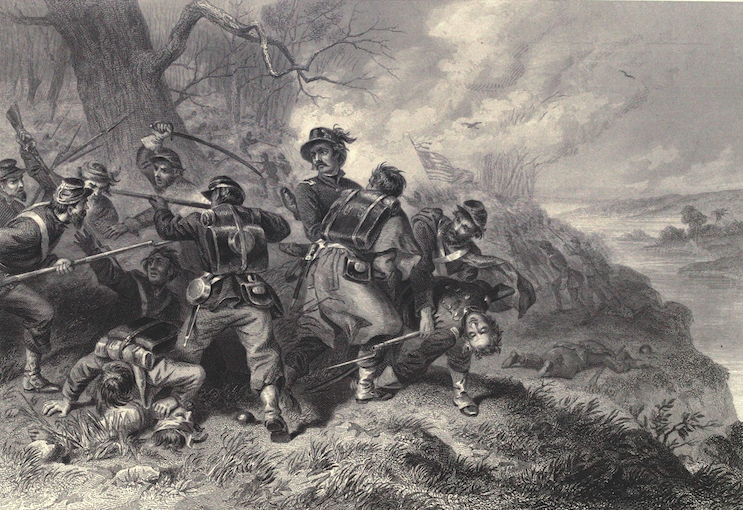
Union soldiers carry the body of Colonel Edward Baker as they retreat during the fighting at Ball’s Bluff.
Once, when their fire slackened, I ran out on the hill with the color Sargeant and the color and Shouted to the men to rally round the color. About 40 men ran out, but a sharp fire of the rebels drove them back. I saw our col. last behind the Cannon. He had given the order of retreat, as I heard, but I do not believe it possible; as there Could be no retreat. The ravine and the banks of the river were now crowded with men. Some were sitting down behind trees and stones. Some were carrying the wounded, and some were throwing away their guns and trying to swim across. On the opposite bank were two hundred of our men, who had been
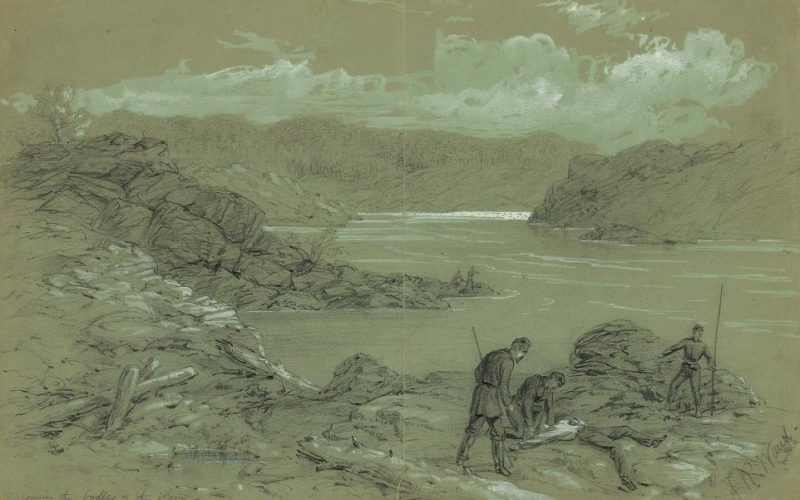
“Discovering the bodies of the slain in the Potomac River,” Alfred R. Waud’s sketch of the aftermath of the Battle of Ball’s Bluff.
sent to reinforce us, but Could not get over. All this time the rebels were firing volley after volley over the hill, but they did not advance to the woods; why I do not know, as our fire had almost ceased. I went down the ravine and heard that the Col. & major & adjutant had gone up the river with a white flag and were going to surrender. I saw Capt. Tremlett, and he was going to march his men up with a white flag and give up. So I walked round and … called for the men of Co. D, but they had got scattered when we got rallied round the flag and I could only find one or two of my men. The river was now full of men who were drowning and shouting for help; but there was no help to give them except from God. I never saw such a sight and God grant I may never see such another. I was all covered with blood from some one, I suppose who had been shot near me. I felt very faint, and the men seeing the blood supposed that I was wounded, and those who managed to get across the river to the island, which we held, reported me as killed or taken prisoner. It was now about 6 o’clock. I wandered round trying to find my men and went back to the brow of the hill, but there were none of them there.
The rebels were advancing and firing down the ravine. The men were calling out that they would surrender; and the rebels were shooting at the men who were swimming over. So I went higher up the stream and took off my clothes, & taking my watch in my hand (I was too tired to try to take anything else, and indeed I hardly thought I could swim over at all, as the water was cold and the distance great). When I started there were a few men left who could not swim and who were going to give themselves up. By the help of God I got over and ran to a haystack on the island, and there found Some knapsack which we had left, when we started on the expedition. The island was crowded with soldiers who had been sent over to hold it, in case the enemy should attack it. Out of the knapsacks I got a rubber blanket, a woolen blanket, and a pair of drawers. One of the soldiers gave me a coat God bles him! a man named Dennis, one of the Tammany Regt. Co. A. I slept under a haystack, & in the morning went across the river and got to the camp. We had only 418 of our Regt. in the fight. We took out 22 officers and only 9 have returned unharmed I must close this now. The officers – men who were in the fight yesterday & who got back as now in Camp. The rest have crossed the river at Edwards Ferry[.] We now have a large force there & there … will probably be a fight today or tomorrow … shall not be in it. I shall write again soon[.]
Goodbye. Give my love to all & believe that I did my duty.
your affectionate son
Caspar
P.S. My 1st Lieut. Perry is missing. I saw him at 5 o’clk and he was not wounded then.

